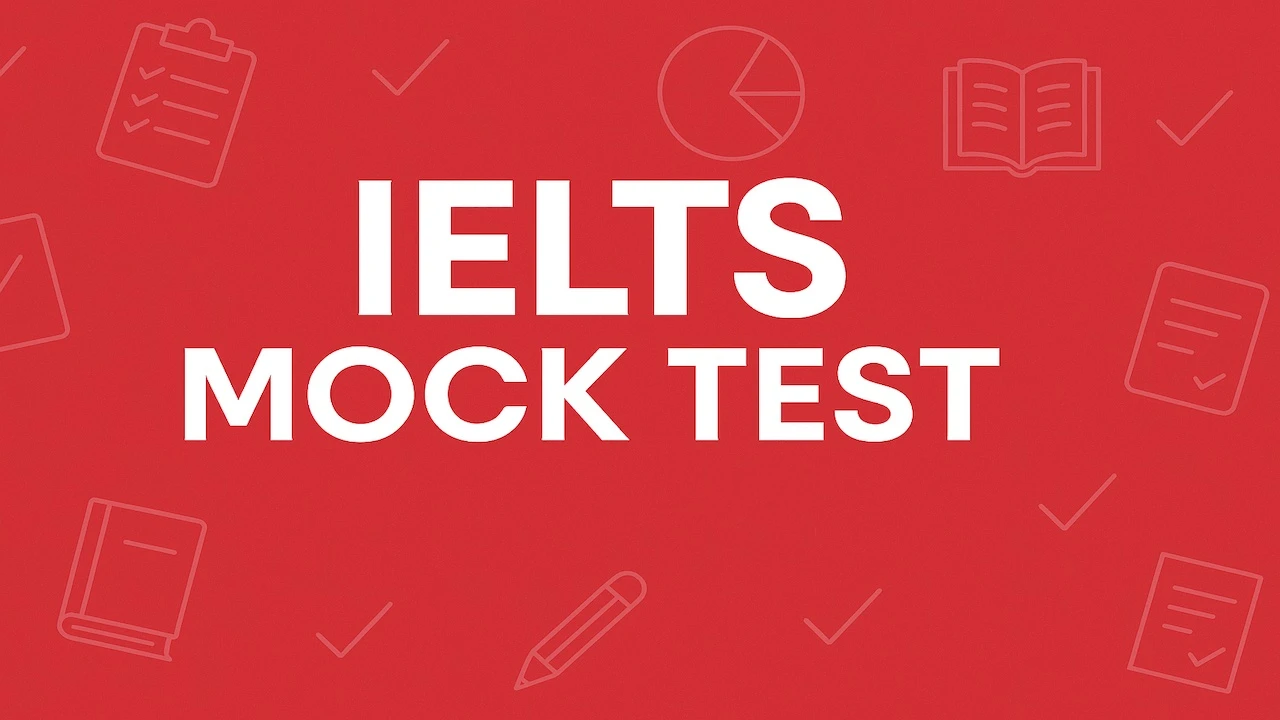IELTS mock test platforms provide realistic exam simulation with instant scoring and detailed performance analysis. Students can practice all four sections – reading, writing, listening, and speaking – through computer-based or paper-based formats that mirror actual test conditions.
Taking regular practice tests helps identify weak areas and improves time management skills. Most online platforms offer multiple test versions with varying difficulty levels to match your current proficiency.
What is IELTS Mock Test and Why Take It
An IELTS mock test replicates the actual International English Language Testing System exam format. Practice tests contain identical question types, timing, and scoring methods used in official IELTS examinations.
Mock tests serve multiple purposes for test preparation:
- Familiarize students with exam format and question patterns
- Build confidence through repeated practice sessions
- Identify specific skill gaps requiring focused study
- Develop effective time management strategies
- Reduce test anxiety through exposure therapy
Research shows students who complete 5-10 practice tests score 0.5-1.0 bands higher than those without mock test experience.
Free IELTS Mock Test Components and Structure
Complete IELTS practice tests include four mandatory sections with specific time allocations. Each section tests different language skills through varied question formats.
Listening Section (30 Minutes)
The listening component features 4 recordings with 40 questions total. Students hear conversations, monologues, and academic discussions while answering multiple choice, matching, and completion tasks.
| Part | Content Type | Questions | Duration |
|---|---|---|---|
| Part 1 | Social conversation | 10 | 7-8 minutes |
| Part 2 | Monologue | 10 | 6-7 minutes |
| Part 3 | Academic discussion | 10 | 8-9 minutes |
| Part 4 | Academic lecture | 10 | 8-9 minutes |
Reading Section (60 Minutes)
Reading tests contain 3 passages with 40 questions covering academic and general topics. Question types include true/false/not given, matching headings, sentence completion, and multiple choice.
Passages progressively increase in difficulty and complexity. Academic version focuses on university-level texts while General Training uses workplace and social contexts.
Writing Section (60 Minutes)
Writing assessment includes 2 tasks requiring different response types and word counts.
| Task | Type | Word Count | Time Allocation |
|---|---|---|---|
| Task 1 | Graph/Chart description | 150+ words | 20 minutes |
| Task 2 | Essay response | 250+ words | 40 minutes |
Speaking Section (11-14 Minutes)
Speaking evaluation occurs through face-to-face interview with certified examiner. Three parts test fluency, vocabulary range, grammar accuracy, and pronunciation.
- Part 1: Personal introduction and familiar topics (4-5 minutes)
- Part 2: Individual long turn with preparation time (3-4 minutes)
- Part 3: Two-way discussion on abstract themes (4-5 minutes)
Best Online IELTS Mock Test Platforms
Multiple websites provide free and premium IELTS practice tests with varying features. Top platforms include British Council, IDP Education, Cambridge English, and Magoosh.
British Council IELTS Practice
Official preparation materials from test creators include sample questions and scoring rubrics. Free access covers all sections with downloadable practice tests.
IDP IELTS Prepare
Comprehensive online course with 9 practice tests and expert feedback. Premium subscription provides personalized study plans and speaking practice sessions.
Cambridge IELTS Trainer
Academic-focused platform with authentic past papers and detailed explanations. Features adaptive difficulty adjustment based on performance history.
IELTS Band Score Prediction and Analysis
Mock test scoring systems calculate band scores using official IELTS criteria. Automated scoring provides instant results with section-wise breakdowns.
Band score calculation considers multiple factors:
- Correct answer percentages for listening and reading
- Task achievement and coherence for writing
- Fluency and accuracy for speaking
- Vocabulary range and grammatical complexity
Most platforms show predicted scores ranging from 1.0 to 9.0 bands with half-point increments.
Computer Based vs Paper Based IELTS Mock Tests
Practice options include both digital and paper formats matching official test delivery methods. Computer-based tests offer faster results while paper-based versions suit traditional preferences.
Computer Based Benefits
- Instant scoring and feedback delivery
- Easier text editing and revision
- Automatic spell check assistance
- Flexible scheduling options
Paper Based Advantages
- Familiar writing experience for many students
- No technical issues or system crashes
- Better for visual learners and note-taking
- Widely available test center options
IELTS Mock Test Preparation Strategy
Effective preparation requires structured approach with regular practice schedules. Students should complete 2-3 mock tests weekly during intensive preparation periods.
Study Schedule Recommendations
Create consistent practice routine with specific time blocks for each skill area. Daily sessions of 2-3 hours produce optimal results when maintained over 6-8 weeks.
- Week 1-2: Diagnostic tests and skill assessment
- Week 3-4: Focused practice on weak areas
- Week 5-6: Full-length mock tests and timing practice
- Week 7-8: Final review and test strategy refinement
Error Analysis and Improvement
Review incorrect answers thoroughly to understand mistake patterns. Track recurring errors and create targeted study plans addressing specific weaknesses.
Common error categories include:
- Misunderstanding question requirements
- Poor time management leading to incomplete sections
- Grammar mistakes affecting clarity
- Limited vocabulary causing repetition
IELTS Mock Test Tips for Higher Scores
Strategic test-taking approaches can improve performance across all sections. Time management and question prioritization techniques boost overall band scores.
Reading Section Strategies
- Skim passages quickly before reading questions
- Locate keywords in questions and scan for answers
- Manage time with 20 minutes per passage maximum
- Answer easier questions first to build confidence
Listening Section Techniques
- Read questions during pause time between sections
- Predict answer types based on question formats
- Listen for paraphrasing rather than exact word matches
- Use capital letters for proper nouns and names
Writing Section Guidelines
- Plan essay structure before writing begins
- Use varied sentence structures and linking words
- Check grammar and spelling in final minutes
- Meet minimum word count requirements exactly
Speaking Section Advice
- Practice speaking aloud daily with varied topics
- Record responses to identify pronunciation issues
- Use natural pace without rushing or hesitating
- Expand answers with examples and personal experiences
Common IELTS Mock Test Mistakes to Avoid
Students frequently make preventable errors during practice sessions. Identifying common pitfalls helps avoid similar mistakes during actual examinations.
Time Management Errors
Spending excessive time on difficult questions reduces available time for easier items. Practice strict timing discipline during mock tests to build automatic pacing habits.
Question Misinterpretation
Reading questions too quickly leads to incorrect answer choices. Highlight key instruction words like “NOT,” “EXCEPT,” and “ONLY” to avoid confusion.
Transfer Mistakes
Copying answers incorrectly from question booklet to answer sheet causes unnecessary point loss. Double-check transferred responses during final review minutes.
IELTS Mock Test vs Real Test Differences
Practice tests closely mirror official examinations but contain subtle variations. Mock tests typically feature slightly easier content to build student confidence.
Key differences include:
- Actual tests may have unique question formats not in practice materials
- Real test environment includes additional stress factors
- Official scoring may be more stringent than automated systems
- Speaking tests require human interaction rather than recorded responses
People Also Ask – IELTS Mock Test FAQ
Take 8-12 complete mock tests during preparation period. Space practice sessions 2-3 days apart to allow adequate review time between attempts.
Free mock tests provide reasonably accurate practice but may lack detailed feedback. Premium platforms typically offer more precise scoring algorithms and comprehensive analysis.
Most online platforms support mobile access with responsive design. However, computer screens provide better experience for reading passages and writing tasks.
Begin mock tests after 2-3 weeks of basic skill development. Early diagnostic tests help identify study priorities and create targeted preparation plans.
Quality mock tests predict actual scores within 0.5-1.0 band range. Multiple practice test averages provide more reliable predictions than single attempts.
Academic tests feature university-level content while General Training focuses on practical situations. Reading and writing sections differ significantly between versions.
Retaking identical tests inflates scores through answer memorization. Use varied practice tests from different sources to maintain assessment accuracy.
Review each incorrect answer to understand mistake patterns and knowledge gaps. Create study plans addressing specific weak areas identified through error analysis.
Many platforms provide AI-powered speaking practice with pronunciation feedback. However, human conversation partners offer more realistic preparation for actual interviews.
Always practice under timed conditions to develop proper pacing skills. Use official time limits for each section to simulate actual test pressure.

